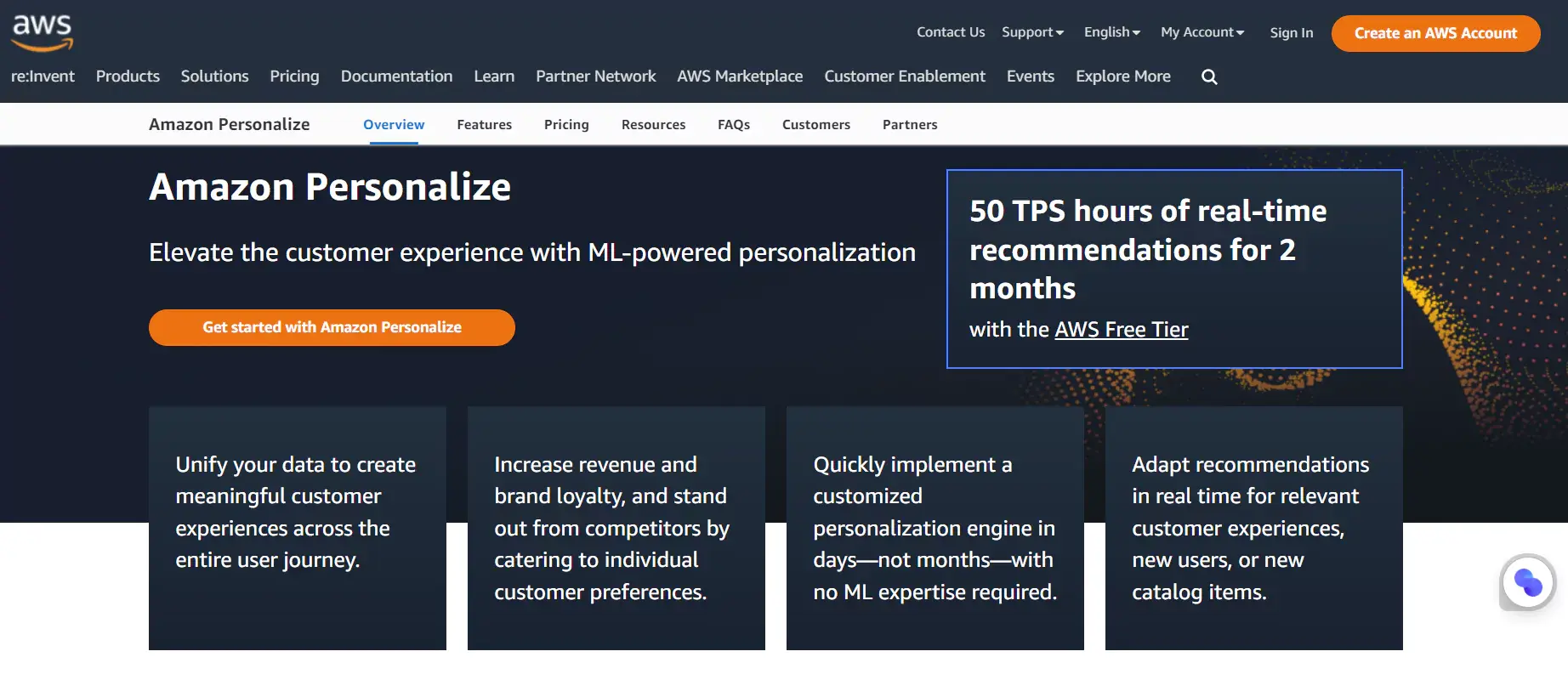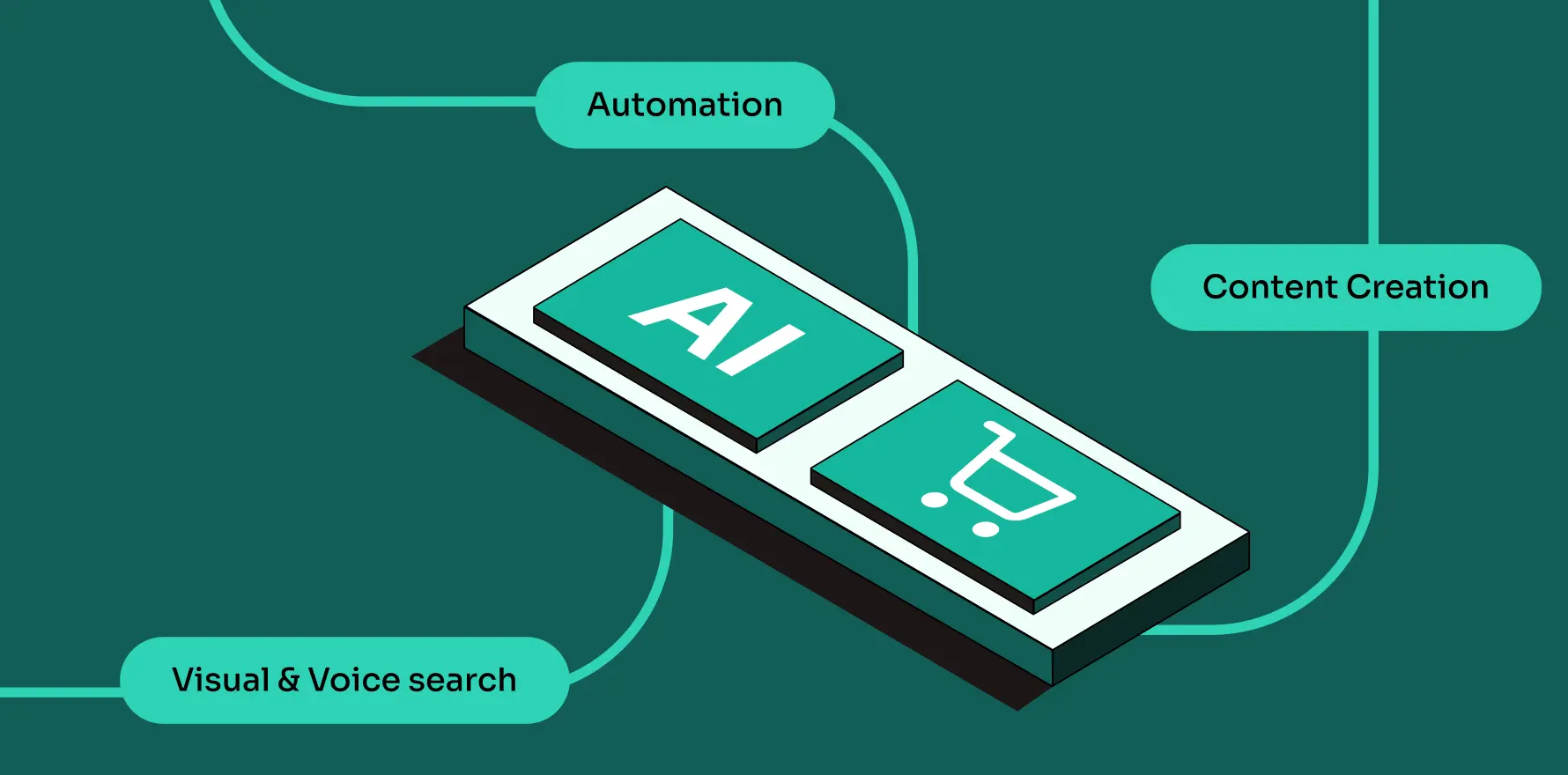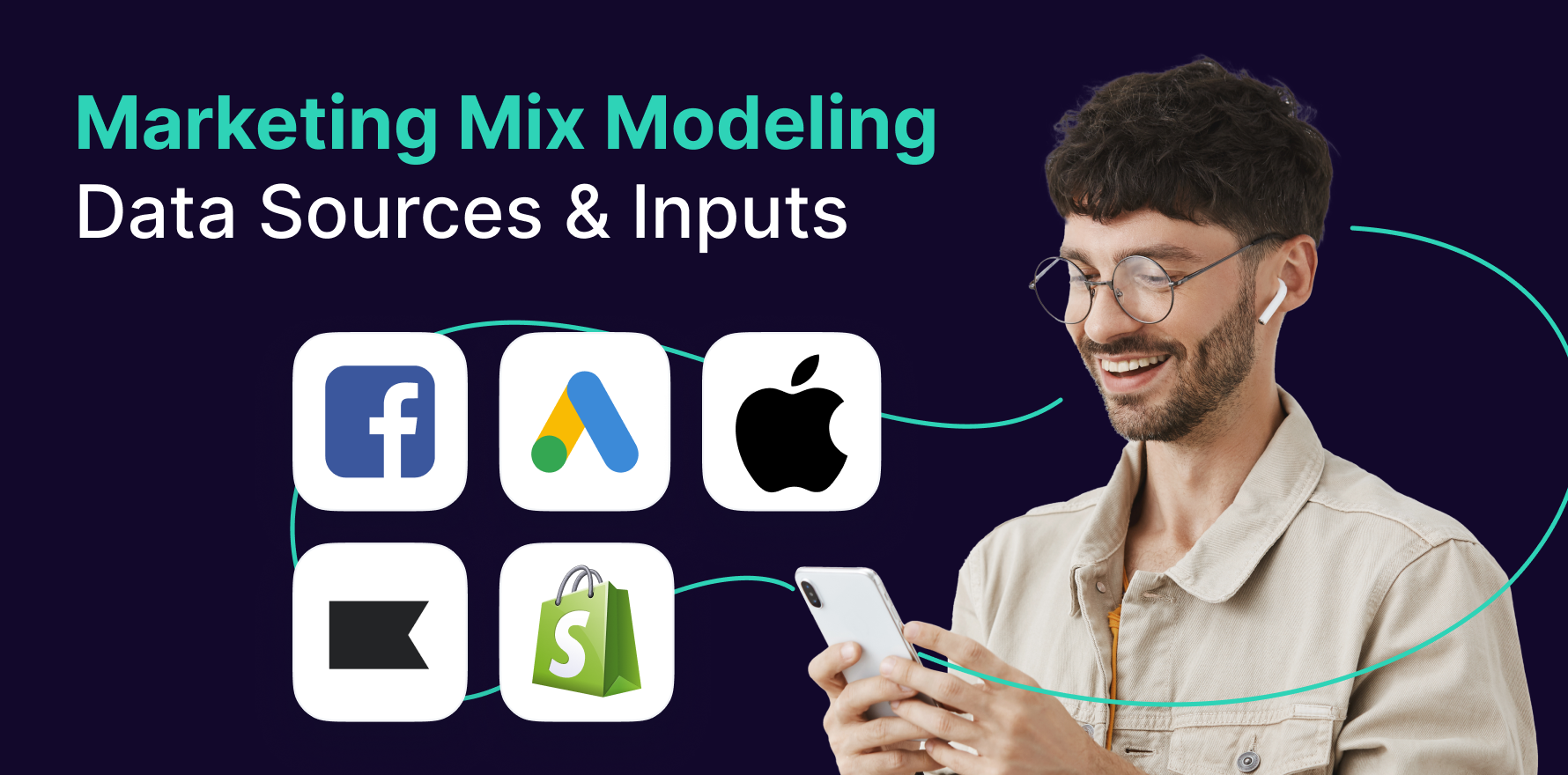The advent of artificial intelligence has brought about a new era of opportunities for all businesses, including Ecommerce brands. This has driven companies to constantly seek ways to harness the power of AI to streamline their operations and stay ahead of the competition.
AI has the potential to change the game of Ecommerce marketing entirely, from personalizing customer interactions to automating mundane tasks. By integrating AI into your marketing funnel, you can boost every aspect of your marketing journey, from brand awareness to sales and customer retention.
What are the benefits of artificial intelligence in ecommerce?
- More targeted advertising and marketing by analyzing big data from purchase histories and customer interactions.
- Increased revenue and customer retention from personalization and omnichannel strategies.
- Automation of product recommendations, loyalty discounts, and low-level customer support.
- Automation of follow up abandoned cart inquiries.
Throughout this article, we’ll explore the different types of artificial intelligence, the ways in which artificial intelligence in ecommerce is changing the marketing game, and how you can leverage these advancements to stay ahead of the competition.
8 ways AI applications are transforming ecommerce marketing
1)Personalization
Personalization is one of the most common AI use cases in ecommerce. Creating a personalized customer journey should be at the top of your priority list if you want your Ecommerce brand to succeed. According to a study, 91% of customers state that they are more likely to purchase from the same provider if they have had a smooth and personalized customer lifecycle management.
With the right ecommerce AI tools, you can swiftly analyze customer data and behavior in real time, helping you zero in on what your customers really want. This also allows you to identify patterns and predict future behavior, allowing you to personalize your marketing campaigns, resulting in higher engagement and conversion rates.
Ecommerce AI tools like TUP e-Commerce, Granify, and Boomtrain, provide you with the ability to gather and analyze customer data from various touchpoints, including mobile apps, email campaigns, and websites. These insights can help you make personalized product recommendations and create a seamless, consistent experience for your customers across all devices and touchpoints.
Using the data they collect from customers through quizzes, Ecommerce lingerie brand ThirdLove tailors their product recommendations and other marketing campaigns using AI. The AI ecommerce personalization helps ThirdLove customers find the right products, leading to improved conversions and customer satisfaction.
ways-artificial-intelligence-is-changing-ecommerce-marketing-personalization-like-thirdlove 
ways-ai-is-changing-ecommerce-marketing-personalization-example-thirdlove-(1) 
ways-ai-is-changing-ecommerce-marketing-personalization-example-thirdlove-(2) 
ways-ai-is-changing-ecommerce-marketing-personalization-example-thirdlove-(3) 
2) Customer segmentation
Effective customer segmentation is key to delivering personalized experiences that resonate with your target audience. By understanding the unique characteristics and needs of different segments of your customer base, you can make data-driven decisions about product development, pricing, marketing strategies, and in-app recommendations.
However, traditional methods can be ineffective, as these methods mostly rely on demographics and past purchase history, which may not always accurately depict a customer’s current needs and preferences. As a result, marketing campaigns fail to attract target audiences, resulting in revenue losses.
This is where AI in ecommerce comes to your assistance.
AI-driven systems can analyze customer data to identify patterns, carry out behavioral segmentation, optimize engagement strategies, and achieve specific goals by learning and adapting, resulting in highly precise and effective customer targeting.
Additionally, AI algorithms can analyze customer data in real-time, including browsing history, demographics, purchase history, social media activity, and search queries. Artificial intelligence for marketers allows for more accurate customer segmentation and effective marketing campaigns that can drive increased engagement, customer retention and loyalty, and revenue.
Let’s take the artificial intelligence example of Amazon Personalize, a powerful tool that automates identifying high-value customers, saving you the time and resources required to create and maintain complex catalogs of rules manually. Using this type of artificial intelligence tool, you can easily create compelling user segments that scale with your product catalog.
Additionally, Amazon Personalize continuously learns from your users’ behavior, allowing you to deliver personalized experiences that align with their changing needs and preferences.
ways-ai-is-changing-ecommerce-marketing-segmentation-example-amazon 
3) Automation
Running a successful marketing campaign requires careful planning, management, and analysis, which can be time-consuming and tedious. These challenges can lead to delays in campaign execution, resulting in decreased efficiency.
However, by utilizing advanced technologies such as artificial intelligence and automation, Ecommerce businesses can streamline and optimize their marketing efforts, reduce the burden of manual tasks, and allow for more effective and efficient campaign execution.
Additionally, AI automation can help increase the ROI of your marketing campaigns and drive business growth, as 76% of brands that implement automation see a positive ROI within one year.
Some of the key ways in which artificial intelligence for marketers can automate Ecommerce marketing campaigns include:
- Email marketing: Analyze customer data, such as purchase history, browsing behavior, and engagement, to create personalized and targeted email campaigns that are sent to the right customers at the right time.
- Social media marketing: Analyze customer behavior on social media platforms, such as demographics and interests, to create personalized and targeted social media campaigns.
- Ad targeting: Leverage customer data, such as demographics and browsing behavior, to create personalized and targeted ads that are more likely to convert into sales.
- Automated Campaign Management: Streamline the management of campaigns by automating the scheduling, optimization, and performance analysis.
Automation driven by AI not only saves time and resources but also produces better results. The benefit of leveraging AI applications in ecommerce includes more successful retention marketing campaigns which resonate with your target audience.
Read more: 7 Ways automation can improve your customer experience.
4) Content creation
Generating high-quality content consistently that aligns with the interests and needs of your target audience can be daunting. One of the newest and widely spreading use cases of artificial intelligence for marketers is harnessing the power of AI-driven content creation tools. The AI content writing tools enable you to produce a wide range of personalized and engaging content at scale that effectively caters to your audience.
Additionally, the benefit of artificial intelligence in ecommerce is that you are equipped with valuable insights into your customers’ behavior. With the ability to analyze customer data, you can gain a holistic understanding of your target audience’s journey and identify the most effective channels to reach them.
Artificial intelligence can also help you optimize your content strategy by identifying the optimal times to publish based on when your audience is most likely to engage with your product. By utilizing these insights, you can make informed decisions that drive greater reach and engagement for your brand.
One of the most powerful benefits of AI is its ability to learn and identify patterns. With the use of advanced algorithms, artificial intelligence for marketers can analyze customer data to understand the type of content that resonates with your target audience. And by monitoring engagement rates with your brand and your competitors on social media, AI can utilize predictive analytics to anticipate which content will perform well on your social media platforms. This allows you to create a more effective and data-driven content strategy.
Some of the widely used Ecommerce AI tools for content generation are: Jasper, Rytr, and Grammarly.
The future of artificial intelligence in ecommerce from a lens of AI writing assistants would be: automating content creation for low-level SEO programs so that marketers and writers can focus on more value-driven activities.
5) Visual and voice search
AI-powered visual and voice search is revolutionizing the way customers search for products online, allowing them to easily find similar items through images or voice commands rather than text-based queries. This technology eliminates the frustration of inaccurate search results and makes the shopping experience faster and more efficient for your customers.
With the growing popularity of virtual assistants and smartphones, you can capitalize on this AI in Ecommerce example by optimizing your websites and marketing efforts to accommodate voice and visual search capabilities, providing a more seamless and user-friendly experience for your customers.
The different ways in which can you leverage AI in Ecommerce for voice and visual search are:
a) Voice search optimization
Optimizing your ecommerce websites and product listings for voice search can significantly enhance the customer experience by making it more convenient for them to discover products using voice commands. To achieve this, you can incorporate long-tail keywords, use conversational language, and address frequently asked questions in your product descriptions and website pages.
This AI application in ecommerce not only makes it easier for customers to find products but also improves the usability and accessibility of the website.
b) Voice assistants
You can tap into the power of popular voice assistants like Amazon Alexa and Google Assistant to enhance the customer experience and boost sales. By integrating these platforms, DTC and Ecommerce brands can enable customers to make purchases directly through their voice-enabled devices.
c) Visual search
You can also harness the power of visual search to enhance the customer experience and improve product discoverability. By incorporating high-quality images and videos on product pages and integrating with leading visual search platforms such as Google Lens and Bing Visual Search, customers can easily find your products by simply taking a picture or uploading an image.
This approach not only makes the shopping experience more convenient but also allows Ecommerce brands to showcase their products in an engaging and visually appealing way, ultimately driving more sales.
d) Augmented Reality
You can leverage augmented Reality (AR) to offer your customers an immersive and interactive shopping experience. By incorporating AR technology, you can create engaging and personalized experiences that allow customers to virtually try on clothes, preview furniture in their living space, and much more.
An excellent example of how Ecommerce brands can leverage this artificial intelligence technology is IKEA’s AR app. With this app, customers can not only preview how IKEA furniture would look in their own homes before making a purchase but also take pictures of home pieces they like and search for similar products.
ways-ai-is-changing-ecommerce-marketing-agumented-reality-example-ikea 
6) Remove fake reviews
Online product reviews play a crucial role in shaping customers’ purchasing decisions, as an overwhelming 99.9% of customers read reviews before making a purchase. However, the presence of fake reviews can severely undermine the credibility of your business and harm its reputation. These fake reviews can mislead customers, causing them to avoid purchasing products that have been falsely endorsed. This not only leads to lost sales but also erodes customer trust in your business.
To combat this, you can leverage the power of AI to detect and remove fake reviews. Another common AI use case in ecommerce is the artificial intelligence algorithms that can be trained to identify patterns and anomalies in customer feedback and reviews, flagging suspicious reviews for further investigation. Additionally, artificial intelligence in ecommerce can be used to analyze customer feedback and remove duplicate or fake reviews, ensuring that only authentic and trustworthy reviews are visible to customers.
AI can effectively identify and eliminate fake reviews using Natural Language Processing (NLP) by analyzing the language and tone of customer feedback. You can train AI algorithms to recognize patterns and anomalies in reviews and flag suspicious reviews for further investigation.
This enables you to easily detect and remove fake reviews, ensuring that only authentic and trustworthy reviews are visible to customers, ultimately protecting the stature and credibility of your business.
Read more: A detailed guide on Ecommerce hyper-personalization strategies.
7) Churn prediction
Retaining existing customers is crucial for any business, as acquiring a new customer can cost up to 25 times more than retaining one. Therefore, taking a proactive approach to user retention is imperative if you want to minimize your Ecommerce and DTC businesses’ customer churn and increase customer loyalty.
One effective method for reducing customer churn is to use artificial intelligence to sift through large amounts of data and identify clusters of users who are at risk of leaving. This allows you to prioritize those users based on their likelihood of churning and take steps to prevent them from leaving.
Ecommerce AI tools such as Zams AI offer a continuous overview of customer interactions with your brand through various channels, including email campaigns and websites. This data is extremely useful as it helps you understand what areas need improvement and how you can better cater to your customers’ needs.
A critical AI use case in ecommerce is: AI-powered automation of routine tasks in customer service with chatbots. Along with improving the speed and accuracy of responses, artificial intelligence increases customer satisfaction and reduces the likelihood of churn.
8) Virtual fitting rooms
Online shopping can be a challenge for customers as they may not be able to determine whether a certain item will fit or look good on them without trying it on first. This can result in a high number of returns, which can be costly for Ecommerce brands. The NRF reports that fit and size are the primary reasons for online apparel returns, accounting for 42% of all returns.
To reduce Ecommerce return rate, leverage AI-powered virtual fitting rooms or virtual try-on technology to visualize a range of products – from clothing and footwear to sporting goods. The benefit of artificial intelligence in ecommerce virtual fitting rooms is that customers can try on the clothes virtually before making the purchase.
With an augmented reality type of artificial intelligence, you can accurately represent a customer’s body and show them how clothes will fit and look. According to Shopify, customers who used augmented reality software to try on clothing were 40% less likely to return the item.
In August 2021, apparel retailer Gap made a strategic acquisition of Ecommerce startup Drapr. The startup specializes in 3D virtual fitting technology, providing a practical example of how to create AI avatars allowing clients to create 3D avatars of themselves and virtually try on apparel.
ways-ai-is-changing-ecommerce-marketing-virtual-fitting-rooms-example-drapr 
Conclusion: The future of artificial intelligence in Ecommerce is already here
Undoubtedly, artificial intelligence in ecommerce will help DTC and ecommerce businesses to engage with customers in more creative and unique ways. Even though we’re still scratching the surface of AI applications in ecommerce, it is clear that artificial intelligence will have a major impact on how businesses operate in the future.
This blog gives a glimpse into how artificial intelligence helps ecommerce businesses at every touchpoint in the customer journey.
Nevertheless, it’s crucial to keep in mind that AI is not a quick-fix solution; rather, it is a tool that you must use strategically to achieve the desired outcomes.
FAQS
1) What are some of the artificial intelligence examples in ecommerce?
Amazon is using artificial intelligence for:
- Real-time product recommendations
- Style recommendations
- Checking catalog quality
- Battling fake reviews
Etsy, the second largest online marketplace after Amazon also uses AI for:
- Image search and fit
- eBay Shopbot
- Shop The Room for tailored search results
2) What are the different types of artificial intelligence technologies being commonly used?
The different types of artificial intelligence technologies are:
- Natural Language Processing
- Machine Learning
- Deep learning
- Robotics
3) How can artificial intelligence help Ecommerce businesses?
The AI use cases in Ecommerce include:
- Personalized marketing campaigns
- More efficient customer segmentation
- AI-content creation at scale
- Detecting fake reviews
- Churn prediction
- Visual and voice search
- Virtual fitting rooms
- Automation at scale
You may also like
Essential resources for your success















